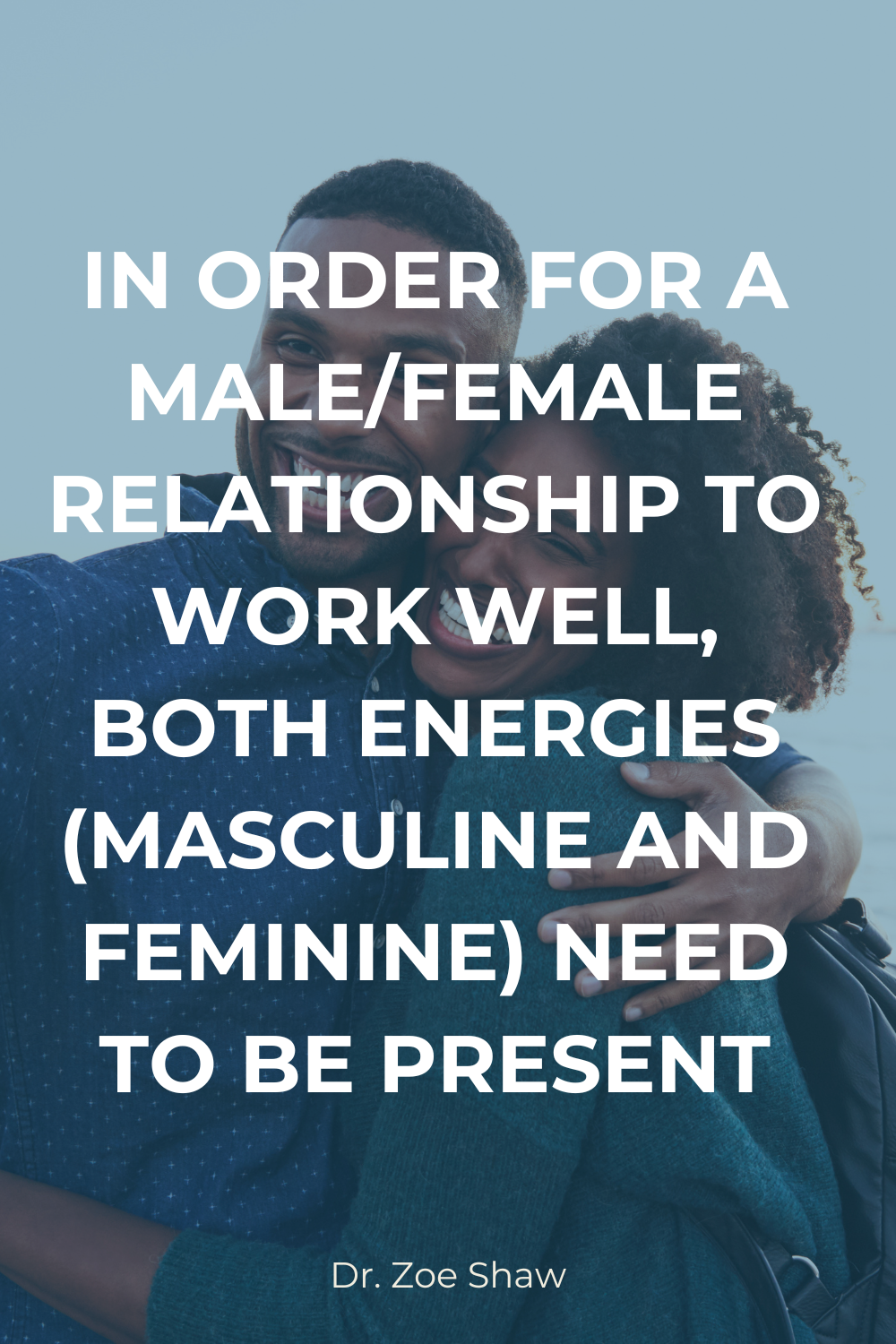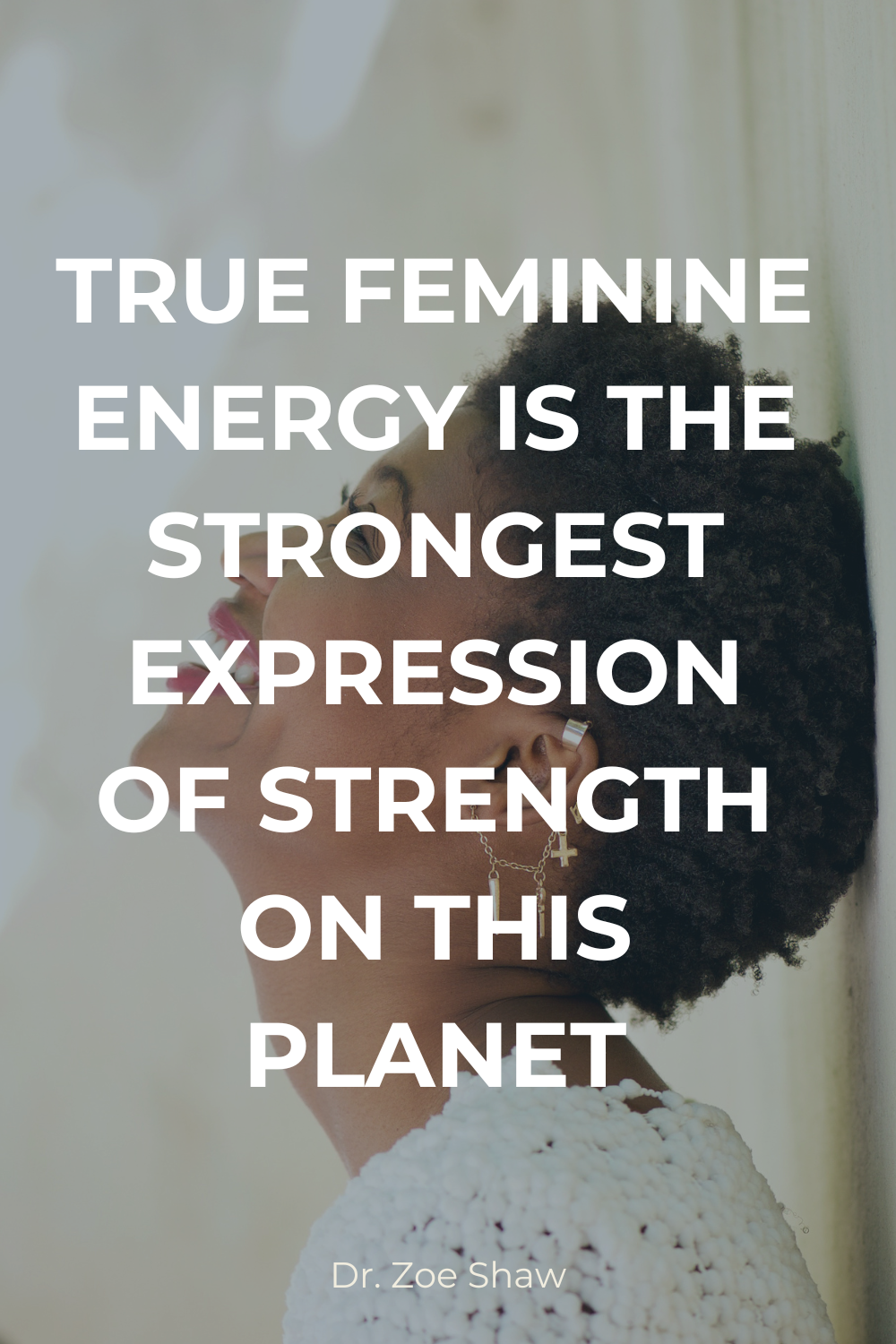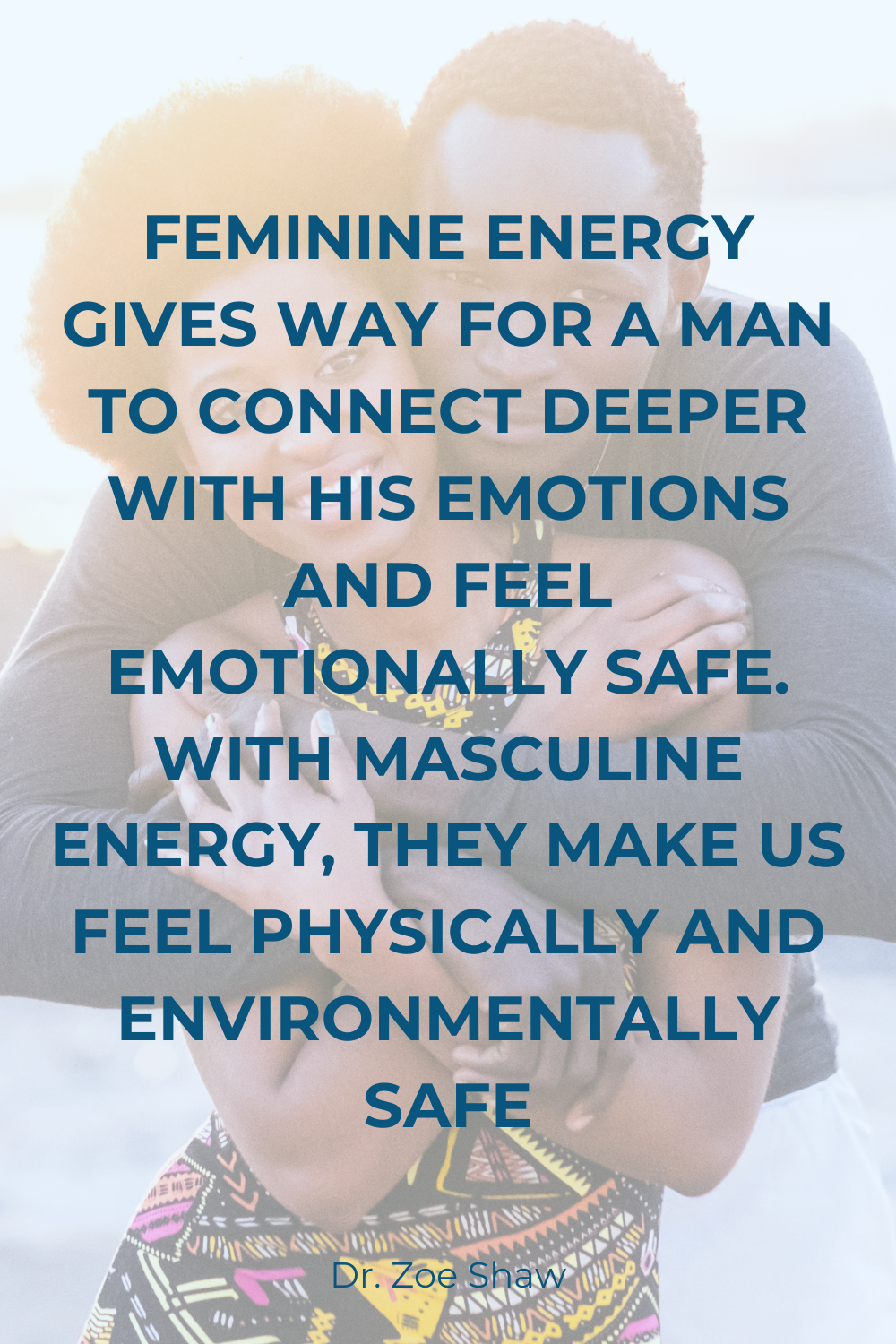So many of my clients complain that their men aren’t showing up for them in the way they want.
What I’m going to talk about may feel controversial to some, but as independent and feminist as I am in my thinking, I am also keenly aware of the real biological/hormonal differences in men and women and how that affects our psychology.
Men and women are equal but different. I know in many ways women are emotionally stronger than men.
I often think it was the women who stayed at the cross of Jesus when all the men, including his 12 disciples, left. Time and time again, I have watched women wade through horrific things while being the emotional and psychological glue that has held their whole family together. The strength of men is different. Men possess far more physical strength, but ironically, science has proven that women have more stamina and endurance than men. I think this holds just as much emotionally as it does physically. Essentially, men can hold more weight, but women can hold it longer!
I want to be clear that this is not a man-bashing blog post. Quite the contrary. Men are amazing creatures, and I believe we were made perfectly for each other. When you have two healthy, equally yoked partners in a marriage who respect each other’s strengths and weaknesses, there is something so majestically and spiritually powerful—exactly what God created us to be as man and woman. We also know that it’s healthy for children to be raised in households where there is both masculine and feminine energy. Thank God he didn’t make us the same. We need to value the differences in our strengths.
All that said, I feel that many women, especially high-achieving women, are losing. They are losing in the dating game, they are losing in the marriage game, and many of them are not happy.
I think there are a multitude of reasons why this is happening that have a lot to do with our shifting culture.
One of them is that women are losing their grip on our femininity. I also think we are losing respect for it as well for good reason.
We are still paid less than our male counterparts, there are still consequences for gaps in our resumes, and motherhood and femininity have not proven to be valuable in our society, although we give it lip service. It’s no wonder why so many women don’t value it as well.
And the flip side is that men reap the benefits of women who express their masculine energy, all while they are repelled by it at the same time. And so we have this contention.

This becomes a problem because in order for a male/female relationship to work well, both of those energies (masculine and feminine) need to be present. I think men know this way more than women do, but they feel silenced by society to speak about this much because the idea that a man would want a feminine woman has been deemed toxic masculinity or a patriarchal agenda.
However, we don’t think of a woman wanting to have and nurture children or desiring a man who can be a good provider to be toxic femininity. It’s simply a natural, estrogen-driven desire for many women.
So, I say all of that to say that when the feminine/masculine balance in a relationship is off, the relationship feels less rewarding. If this happens in the early stages of meeting or dating, the relationship will fail to ever take off, often leaving the woman to wonder what happened. If this balance is off in a marriage, the marriage will not be happy.
What I am finding is that women are losing their natural sense of femininity, and when I start to talk to them about walking more in the feminine, they become confused. They confuse cooking a meal or even giving a man money with taking care of him. What they are missing is the importance of letting the man take care of them.
Some men are also confused about what masculine energy is, and they demand a level of care and respect that they haven’t yet earned. But this is another conundrum we aren’t getting into today.
So, first let me talk about how not walking in your feminine energy is hurting your relationship.
A system must have equilibrium. A relationship is a system. When there is an imbalance in a system, it has two choices: overcorrect to bring back the balance or change roles to create balance. If you are walking in your masculine energy in your relationship, your man’s natural response will be to puff up and assert his dominance (what we call toxic masculinity) or recoil and become passive, which by the way, is also not what we really want.
So my point is, how is your masculine energy showing up in your relationship, and how is this impeding your relationship?
“I’ve got it syndrome” is masculine energy. What is “I’ve got it syndrome”? It’s taking over and declaring that you can do everything.
Tell the story of the package. I’m so used to taking care of myself… it didn’t cross my mind, but what really didn’t cross my mind is the message I was sending to him that I didn’t need him. Men need to be needed.
Some men may never say it, but I promise you, they think it.
There are three types of women that I am seeing in my practice:
1. The woman who wants to fight against the patriarchy and often sees anything masculine as toxic.
She is very much standing in her masculine energy and declaring to the world, “I don’t need a man.” These women, even if they have some sort of faith, feel like they almost have to denounce their faith in order to stand up for themselves and against the patriarchy. This can be incredibly disturbing and cause substantial internal turmoil.
2. The woman who doesn’t align with feminism in any way and espouses very traditional roles.
She reports feeling very comfortable being in the feminine role, following much of the traditional ways that opposite genders interact in a heterosexual, very traditional relationship, believing very much that she should be submissive. She was often taught or role-modeled this and feels a large sense of guilt or shame even thinking of stepping out of this role. She tends to have trouble caring for herself and is often depressed and/or anxious.
3. Then there are those who haven’t thought much about relationships and their complexities, but they have just recognized something isn’t working and they don’t know why.
I’m sure there are women who are balancing it all very well, but they don’t usually end up in my practice.
So, I want to propose what I call The Third Option. The third option for being in a relationship is one that doesn’t swing the pendulum so far left that you don’t know how to be interdependent but doesn’t swing it so far right that you lose a sense of yourself and have to abandon yourself daily to make the relationship work. I also feel strongly that although our modern Christianity is highly patriarchal, that is not what Jesus modeled in his life on earth. I can denounce toxic patriarchal behavior and treatment and not lose my faith in a God who demonstrated when he walked the Earth as man that he valued women and men equally.
And part of this third option of thinking boils down to owning your femininity.
This is such a hard topic to talk about because there are many nuances regarding what makes us feminine. Let’s start with the chemical aspect.
The fact that we live in a day and age where I have to defend the fact that there is a real difference between the genders is astounding. I’m all for people being and doing what they want to do, but to try to deny biology only hurts us as a culture.
Female brains from before birth are bathed in estrogen and a host of other supportive hormones, and male brains are bathed in testosterone and a host of other supporting hormones, which creates very different brains, not to mention physiology. And our feminine and masculine energy is born out of that.
Much of it has to do with childrearing. Feminine energy is more nurturing, and masculine energy is more protective—both in service of taking care of families and continuation of our species.
An interesting caveat is that as women and men age, the hormone tides do begin to turn. With a lowering of estrogen, women’s ratio of testosterone rises, and the opposite happens for men. This was all God-designed, of course, because women no longer need to care for their young in the same way. We are given space to be more assertive and self-caring, and men are given the space to be less dominant. We are still living in a body and psyche that has been bathed in these hormones for half a century, so there is still no getting away from our differences. And so during this transitional time in our lives, there needs to be some adjusting in relationships. It’s one of the reasons why I believe there is the advent of grey divorce. Couples in middle age are divorcing at astronomical rates, and there are some very real cultural and societal reasons for this as well that we aren’t getting into today.

What does feminine energy look like?
True feminine energy is the strongest expression of strength on this planet.
Feminine energy is not about paying attention to how you look (although maybe that’s a part of it), it’s not about being vulnerable (although we can throw that in there too), it’s about recognizing your strength as a woman and not feeling like you have to mask it with masculinity or fake femininity.
Feminine energy is a connecting and nurturing energy. It offers the space for vulnerability and emotional bonding and helps create a sense of intimacy and understanding. Masculine energy provides clarity and stability. We all have a mixture of both, but imbalances in the relationship can lead to conflict, hurt feelings, and disconnection.
Too much masculine energy may feel insensitive and dominating, while too much feminine energy can feel passive or emotionally unhealthy.
True masculine energy is not dismissive or insensitive; it provides a deep sense of safety, direction, groundedness, and an energy that says, “I’ve got you.”
A woman’s healthy feminine energy is just as strong as a man’s, but it represents strength in vulnerability, which I think a lot of women misconstrue as weakness.
When women allow themselves to walk strongly in their feminine energy, they have a strength that cannot be conquered, and they drive their men a little wild. This is not a manipulative type of strength, but an energy that says, “I see you, I accept you, I love you, and I will care for you.”
If either person in a relationship feels a need to suppress their natural energy, either because it is seen as weak or it is seen as toxic, the relationship will become off-kilter.
I feel that most women are naturally feminine, given the hormones their brain is bathing in, but there are reasons why they have learned to shut off their feminine disposition and lean harder into the masculine. When a woman begins to lose respect for a man, she ceases to feel safe and she feels she must protect herself. She does that by shutting off her feminine energy and moving into her masculine. She may become more cold, distant, logical, less understanding, and nurturing. Ironically, a woman who has yet to feel she can trust a man when she is at the beginning of a relationship will do the same thing. My answer to that is to remind yourself that you don’t have to protect yourself from someone else… it is hard for a woman to receive, open up, and let go when she doesn’t feel a sense of strong safety from her male counterpart. The conundrum is that it is hard for a man to find his footing in his masculine energy when the woman is matching his, and the relationship will tend to fall apart, never get started, or have both people jockeying for their role in the relationship.
How do we walk in our feminine energy?
1. At the heart of femininity lies empathy. Nurturing, empathy, sensitivity, and grace. This can also feel like vulnerability.
So many say, “Well, when he has proven to me that I can trust him, I will let myself be more vulnerable.”
I know it is scary to feel like you are being vulnerable with someone whom you don’t know you can trust. I say, know that you can trust yourself and let the guards down. Trust yourself that you are enough, that your emotions aren’t too much, that you can be strong and feminine, and if he doesn’t accept it, you will be okay.
2. Embrace your emotional depth. We are not more emotional creatures.
Men are plenty emotional; we just have easier access to our emotions. We just don’t have to work at it as hard as men do. On top of that, men are socialized to not be so in touch with their feelings, and when we are, we give them a sacred space that they can’t access anywhere else to open up and be more in touch with theirs and ours. We make them feel safe in an emotional way when we are in our feminine energy.
3. Notice I never said cook him food and wash his clothes or clean his house.
These chores are completely inappropriate for a dating relationship, although they are certainly a part of marriage. These chores in and of themselves have nothing to do with your feminine energy, so don’t get that twisted.
4. Feminine energy is curious and caring.
Feminine energy gives way for a man to connect deeper with his emotions. With feminine energy, we make men feel emotionally safe. With masculine energy, they make us feel physically and environmentally safe. We take care of each other in that way. What early dating women fail to see is if they meet their men only with quick wit and intellect, they don’t give men the ability to see how they could be emotionally safe with them.

When women hear this, they say, “So you want me to hide my intelligence, to pretend to be dumb?” Absolutely not! I just don’t want you to hide your femininity and pretend that you are masculine dominant because most of us are not. We use it as a mask to keep ourselves safe.
And in a marriage, we need to use our wit and intelligence to approach our husbands in such a way that they don’t feel demeaned so that they feel safe emotionally even when we are challenging them.
So, I encourage you to run a temperature check in your marriage. Ask your partner:
- How do I make you feel emotionally safe?
- How do I make you feel emotionally unsafe?
- What could I do to make you feel more safe?
And if you are dating, ask yourself, how am I showing up in an open, inviting way for his emotional self to relax into? How am I in tune with my own emotions and inviting his into this space in a healthy way?
And for both, ask yourself, how am I allowing him to care for me and not sitting in my “I’ve Got It” Energy? How am I making him feel needed?
Now there are whole other talks to be had for men about sitting in their healthy masculine energy, but that’s not my lane. Let’s focus on changing you, not them because that does change everything.
I hope this was helpful.







